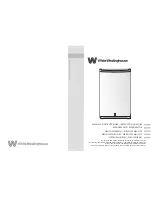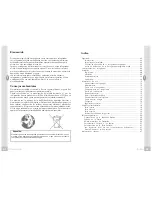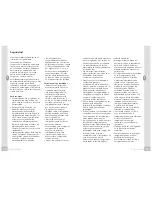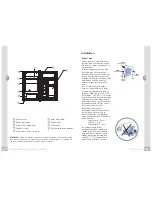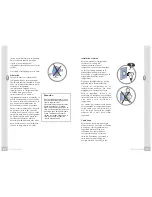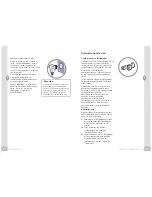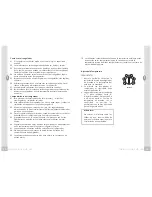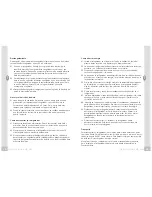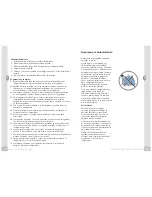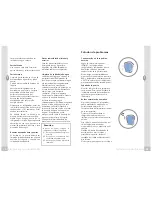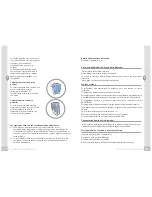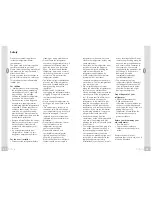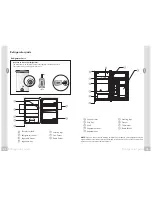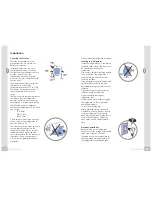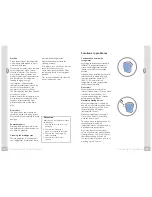
Safety
Safety
27
Safety
Do not use electronic appliances
inside the refrigerator/freezer
compartment.
The gases used as isolator require a
special procedure to get rid of.
Please, throw the packing material of
this product in the way that doesn't
affect the ambient.
Please, contact a local authorities to
get rid of this product in a safety way.
This product contains inflammable
isolator gas.
For children
• Avoid accidents. After unpacking
the refrigerator, keep packaging
materials out of reach, especially
from children. Do not allow
children to handle the refrigerator,
even when it is disconnected.
• Destroy carton, plastic bags, and
any exterior wrapping material
immediately after the refrigerator is
unpacked. Children should never
use these items to play. Cartons
covered with rugs, bedspreads,
plastic sheets or stretch wrap may
become airtight chambers, and can
quickly cause suffocation.
• Remove all staples from the carton.
Staples can cause severe cuts, and
destroy finishes if they come in
contact with other appliances or
furniture.
• An empty, discarded ice box,
refrigerator, or freezer is a very
dangerous attraction to children.
For the user / installer
• Disconnect the refrigerator before
cleaning or doing maintenance.
• Do not leave the refrigerator
unused for long periods of time. If
this becomes necessary, clean it,
open the doors, and leave them
open. We recommend that the
refrigerator be turned on several
times during the period it is not in
normal use. Do not install the
refrigerator outside.
• The following items should not be
place on top of the refrigerator:
heavy and unstable objects, and
heat-producing devices like
regulators.
• Wait at least 5 minutes after
unplugging the refrigerator before
plugging it in again to protect the
compressor from excessive
pressure.
• Never unplug the refrigerator by
pulling on the power cord. Use the
plug.
• Do not compress, fold or tie up
the power cord. Do not change
your refrigerator's plug. If the cord
becomes damaged, it must be
replaced by a service technician
indicated by the manufacturer or
distributor.
• Do not store medication, toxic or
chemical products in the
refrigerator, as they may
contaminate the food.
• Flammable aerosols and
combustible products (gas for
lighters, banana oil, alcohol,
gasoline, propane, etc.) or
products that bear a small flame
symbol should not be stored in
x
refrigerators or freezers, nor come
close to the refrigerator, as they may
cause explosions.
• Never lean on the refrigerator door,
as this may cause the hinges to
become misaligned, allowing the
cold air to escape and the
refrigerator to operate poorly.
• Avoid contact with the cold plate /
internal walls of the freezer
compartment when your hands are
wet or damp. The low temperatures
may injure your skin.
• Do not sprinkle water on top or
along the sides of the refrigerator, as
this can cause a malfunction or
electric discharge and may cause the
metallic parts of the refrigerator to
rust. To avoid the risk of fire, never
place lit candles on top of the
refrigerator. In the event of a gas
leak, do not unplug or touch the
refrigerator until the gas valve has
been closed, and the room has been
aired out. If you use the thermostat
immediately afterward, it may give
off sparks that could start a fire.
• Keep the cord away from the
compressor, as the compressor heats
up when it is operating, and may
damage the cord, which could cause
a short circuit.
• The refrigerator should be plug in its
own outlet. The power cord has a
three-pronged grounded plug for
your personal safety. It must be
connected to a grounding type wall
receptacle, in accordance with the
legislation governing electric
installations in your country, as well
as any local regulations. Do not
remove the grounding prong, do
not use a two pronged adaptor,
and never make a conection to
the schematic. Use the cord
supplied with the equipment (do
not change it). If the cord is
damaged, it must be
immediately replaced by
specialized personnel.
• The performance of you
refrigerator might be effected if
the voltage vary more than 10%.
If the refrigerator works below
the minimum required might
damage the compresor.
Proper disposal of your
refrigerator
• Risk of child entrapment.
• Child entrapment and
suffocation are not problems of
the past. Junked or abandoned
sit for "just a few days." If you are
getting rid of your old
refrigerator , please follow the
instructions below to help
prevent accidents.
Before you throw away your
old refrigerator:
• Remove doors.
• Leave shelves inplace so
children maynot easily climb
inside.
Remove the door(s) of any
appliance that is not in use, even if
it is being discarded.
28
E
N
G
E
N
G

